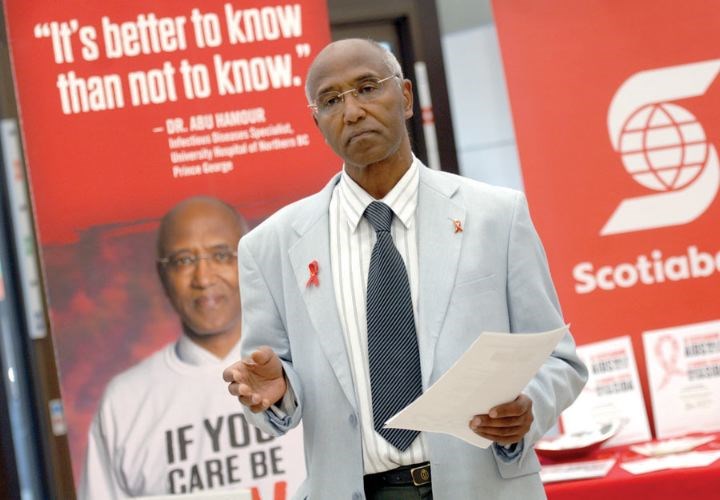Getting tested for HIV could soon become a routine procedure at the University Hospital of Northern B.C.
Infectious disease specialist Dr. Abu Hamour wants to see HIV testing become an opt-out procedure offered to all patients when they visit the hospital. Approximately 250 patients in the Prince George area are currently HIV positive but the actual number of people with the infection is believed to be higher.
Once implemented, patients will routinely be offered a chance to have an HIV test whenever they visit an acute care facility, with the aim of finding more of the estimated 25 per cent to 30 per cent of cases that go undiagnosed.
"When we make a test an opt-out test, it reduces the stigma," Hamour said. "People know that they're not being singled out."
The opt-out HIV testing process has been used for pregnant woman for years and Hamour said most agree to the test. Some hospitals in the Lower Mainland recently adopted an opt-out policy for all patients and were surprised to find some people testing positive for the infection, despite not fitting the typical high-risk groups.
"There might be a lot of people out there that don't know about their infection and we don't know about their infection, those are the people we need to target," Hamour said.
By diagnosing more cases and getting people on highly active anti-retroviral therapy, Harmour said it will not only help the newly diagnosed patients live a longer, healthier life but it will also help reduce the transmission of HIV in the community. He said when people are on treatment their viral loads drop and the risk of transmission can "almost become negligible" if used in conjunction with other preventative measures like protected sex.
Hamour has been named this year's community walk champion for Saturday's Scotiabank AIDS Walk for Life. The 21st annual walk begins at 11:30 a.m. with registration at Masich Place Stadium.
Hamour came to Prince George in 2005 after receiving his training and working in the United Kingdom and Sudan. He set up an infectious diseases clinical service and said HIV was one of the biggest challenges he faced, due to issues like a lack of access to healthcare, poverty and the stigma associated with having HIV.
"We had one of the highest rates of HIV in B.C. and not only that, we had one of the highest rates of HIV-associated mortality in B.C," Hamour said.
In the ensuing years Hamour set up his clinic and Northern Health and other community groups began more aggressive education campaigns to raise awareness and try to stop the transmission of the virus. Harmour believes all that work is paying off with more people with the disease now linked to care than in the past.
Meanwhile, Northern Health is celebrating provincial and international awards for its HIV/AIDS campaigns. The health authority won three Gold Quill awards of merit from the International Association of Business Communicators for corporate social responsibility, advocacy communications and advertising campaigns.
The commendations come on the heels of a Golden Apple for collaborative solutions at the Excellence in B.C. Health Care awards.
"We were congratulated for producing a successful public campaign that focused on a health condition that so often as stigma attached to it," Northern Health chief medical officer Dr. Susan MacDonald said. "We were also praised for delivering clear messages about a very important social issue to a large audience and, most importantly, once again including our community partners."



